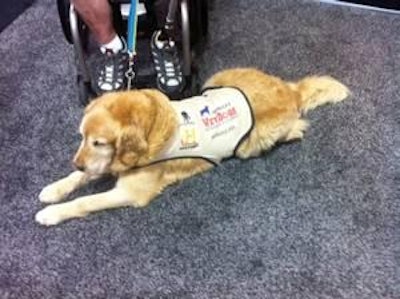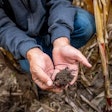
Proper nutrition and feeding a quality petfood are especially important for dogs that act as service and guide dogs, said Wells Jones, CEO of the Guide Dog Foundation for the Blind and America's VetDogs, which train dogs to serve US military veterans and blind people. Speaking as the closing keynote for Petfood Forum 2014 on April 2, Jones discussed how his organization selects, breeds, trains and feeds its dogs that are matched with veterans like Joseph Worley, who served in Iraq as a Navy corpsman and also spoke.
America's VetDogs, founded in 2003, trains dogs to assist veterans of all eras and active military personnel with tasks such as standing up, walking, opening and closing doors, retrieving objects, barking for alert and much more. Jones said America's VetDogs also now partners with petfood company Bil-Jac to offer a line of dog treats whose sales support veterans. The organization is a part of the Guide Dog Foundation for the Blind, which was originally established in 1946 to assist veterans who lost their vision in World War II.
The foundation has its own breeding program for the service puppies in both programs, with some of the dogs being descendants from dogs first bred in the 1960s. Jones explained that the foundation relies on volunteers and prisons to raise the puppies and teach them basic obedience at 7-8 weeks of age for about a year, at which time the dogs return to the foundation's program for formal service dog training. In order to enter the service dog program, dogs must pass a multi-level skills test, including retrieving of metal, wood, plastic and cloth, and a public access test. Dogs are primarily Labrador Retrievers and Golden Retrievers, as well as Standard Poodles, German Shepherds, and a Labrador Retriever and Golden Retriever mix, he said.
After a dog has completed its service dog training, it is carefully matched with a student. Jones referred to these service dogs as a "designer dog," meaning that the foundation works to understand exactly what a person needs in the dog, and then a service dog is selected to meet their precise needs, taking into account capability, lifestyle and pace.
Once a student is matched with the right service dog, the student usually comes to the foundation's campus in New York, USA, to complete a training program that takes 12 days. Jones explained that the foundation's campus includes a student residence hall with 17 private rooms where students stay during their training, a training center equipped with kennels and training space, and a veterinary center.
Service dogs change lives
Following Wells, US veteran Joseph Worley spoke with his service dog, Benjamin, about the dramatic impact on one's life that these service dogs make.
Worley joined the Navy in 2002, and he lost his left leg in Fallujah, Iraq, in 2004. Worley explained that he was working as a medic and was running toward a vehicle that had been hit by an IED, when he was also hit by an IED.
Two years after putting in an application for a service dog from America's VetDogs, Worley received Benjamin in October 2008. Worley said that after he returned from Iraq, his family gathered around to support him. "Despite that support system, when Benjamin entered my life, he became an integral and vital part of that," Worley said.
Worley explained that Benjamin not only helps him physically by helping him brace to stand up, stabilize him when walking, retrieve objects and more, but he also added, "Benjamin gives me confidence."
"These animals can save people's lives and change people's lives," said Worley.
















